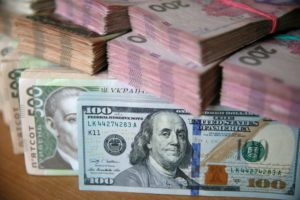
The board of directors of IMC agricultural holding has announced payment of interim dividends to the company’s shareholders in the amount of EUR0.18 per share.
According to the company’s statement on the Warsaw Stock Exchange (WSE), dividends will be paid in euros on August 28, 2020.
According to the WSE, the share price of IMC on August 14 fell by 1.77%, to PLN11.1 per share.
IMC specializes in cultivation of grain, oilseeds and milk production in Ukraine. The agricultural holding cultivates about 123,300 hectares of land in Poltava, Chernihiv and Sumy regions. It owns capacities for storage of 554,000 tonnes of grain and oilseeds.
In 2019, IMC agricultural holding posted $7.32 million in net profit, which is 3.8 times less than in 2018. IMC’s revenue for this period increased by 29%, to $169.6 million, of which $ 142.67 million is export.

The surplus of Ukraine’s consolidated balance of payment in April 2020 reached $716 million, while in April 2019 the deficit was $46 million, according to preliminary data posted by the National Bank of Ukraine (NBU) on Friday.
According to the report, the surplus of the current account of the balance of payment last month was $1.4 billion, and in April 2019 the deficit was $92 million.
The volume of exports of goods in April 2020 decreased by 4% (in March 2020 by 3.5%), to $3.6 billion. The decline was due to a decrease in the export of wood and wood products by 19.6% (by 11.7%), ferrous and non-ferrous metals – by 18.1% (by 13.1%) and engineering products – by 8.3% (by 13.3%), as well as a drop in exports of industrial products and chemical products by 24.2% and 2.5% respectively, which a month earlier had increased by 2.3% and 16.7%.
At the same time, in April, export of food products continued to grow – by 6.6% (by 2.3%) and mineral products – by 12.1% (by 3.5%).
In January-April 2020, exports to Asian countries increased in money terms (by $796 million, or 16.9%), while exports to the EU and the Russian Federation decreased by $555 million (9.7%) and $111 million (13.6%) respectively. Thus, the share of exports to Asian countries of total exports increased to 37% (from 31.3% for the same period in 2019), and to the EU and Russia decreased to 34.6% (from 38%) and to 4.7% (from 5.4%).
In April 2020, import of goods decreased more significantly – by 28.4% (in March – by 6%), to $3.4 billion, including energy imports decreased by 33.4% (in March – by 11.5%), and non-energy – by 28.6% (in March – by 4.8%).
Last month, in particular, imports of engineering products decreased by 28.7% (in March – by 2.6%), including cars by 33.4% (in March, it increased by 21.7%). In addition, exports of ferrous and non-ferrous metals decreased by 36.8% (in March – by 8.6%), industrial products by 23% (by 7.2%) and chemical products – by 17.5% (in March it grew by 2.1%).
At the same time, food imports continued to grow – by 2.1% after rapid growth in March by 20.9%.
According to the results of January-April 2020, imports from Russia (by $924 million, or 37.5%) and from the EU countries (by $314 million, or 4.5%) decreased the most in money terms, while Russia’s share of total imports decreased to 9.2% (from 13.2% according to the results of the corresponding period of 2019), and the EU increased to 40.8% (from 38.2%). At the same time, imports from Asian countries remained almost unchanged – it grew only by $34 million (or 0.8%), and its share of total imports – to 26.3% from 23.3%.
According to the report, the surplus in trade in services in April 2020 tripled to $555 million compared to April 2019, thanks to the higher rate of decline in imports of services (by half) compared to their exports (by 17.0%) due to the COVID-19 pandemic.
A decrease in imports of services occurred along with a 72.2% decrease in expenses of people traveling abroad and short-term migrants, as well as a decrease in transport and other business services by 31.3% and 41.2%, respectively.
At the same time, a decrease in the export of services was facilitated by a decrease in transport services (37.5%) and expenses of people traveling in Ukraine (95.7%), while the export of computer services continued to increase (by 21.3%).
According to the central bank, the surplus in the balance of primary income in April 2020 decreased by 10.4%, to $420 million compared to April a year earlier due to the predominance of a decrease in receipts from payroll (by $158 million) over payments on income from investments (by $120 million).
Net borrowing from the outside world (total current account balance and capital account) last month amounted to $1.4 billion, which is 93.4% less than in April 2019 ($91 million).

Arricano Real Estate Plc (Cyprus), the managing company and developer of some shopping and entertainment centers in Ukraine, has decided to postponed settlement of liabilities in the amount of $47.1 million to Retail Real Estate OÜ (RRE, Estonia), Barleypark Limited and one of its main constructors for the end of 2019.
According to a company report on the London Stock Exchange (LSE), the company has received written representations from Retail Real Estate OU and its affiliated company Bytenem Co Limited that lead the board to believe that the group will not be required to settle in 2019 outstanding accrued interest and other accounts payable in the amount of $21.360 million plus further interest accruing during the year ending December 31, 2019.
Arricano has received a letter from Barleypark Limited waiving its right to claim early repayment of the loan or any part thereof, including, but not limited to all or any part of the interest accrued, amounting in aggregate to $22.004 million until after 31 December 2019.
The group has also received a comfort letter from one of its main constructors, stating that it will not claim payment of invoices amounting to $3.772 until after December 31, 2019.

The surplus of Ukraine’s balance of payment in 2018 grew by 12.1% compared with the previous year, to $2.88 billion, according to preliminary data published by the National Bank of Ukraine (NBU). “The surplus of the balance of payments is recorded for the fourth year in a row. In particular, last year, primarily it was thanks to a significant inflow of capital in a financial account: obtaining official funding from international partners and borrowing on foreign markets,” the regulator said in a press release.
According to the NBU, in 2018, the current account deficit increased to $4.65 billion from $2.44 billion a year earlier due to the widening deficit of trade with goods. The favorable foreign economic situation for most of the year and the high harvest of grains and oilseeds in 2018 supported export growth, but the complication of transportation in the Sea of Azov and repairs at some enterprises held back its growth, the regulator said.
The NBU said that strong domestic demand and high energy prices have led to a high growth rate of imports of goods compared with exports.
According to the NBU, in 2018, exports of goods grew by 9.2%, to $43.34 billion, while imports by 14.0%, to $56.3 billion.
The central bank said that the sale of food products abroad increased by 4.8%, primarily thanks to an increase in sales of grain crops by 11.4% in monetary terms.
In addition, exports of ferrous and non-ferrous metals grew by 15.3% thanks to favorable pricing conditions.
The largest increase in exports, as the central bank said, occurred in the EU countries – by 15.5%, as a result of which the share of EU countries of total exports of goods increased to 37.6% from 35.6% in 2017. At the same time, the share of Asian countries decreased from 32.4% to 31.5% and Russia’s – to 7.0% from 8.5%.
As for imports, energy imports increased by 15.0%, primarily due to higher global energy prices, the NBU said.
The regulator said that non-energy imports grew by 13.7%, in particular, under the influence of strong domestic demand, imports of engineering products continued to grow at a high rate – by 17.8%, food and industrial goods – by 17.6% and 21%, respectively.
Last year, most of all, imports of goods from Asian countries increased – by 27.3%, as a result, their share increased to 22.4% from 20.1% in 2017. At the same time, despite the increase in imports from EU countries (by 12.4%), their share decreased to 36.6% from 37.2%. Russia’s share also declined – to 14.2% from 14.5%.
The National Bank links the growth of services exports over the past year by 10.6%, to $15.67 billion, primarily, with an increase in exports of services of the IT sector, processing of raw materials supplied by customers and the provision of services in the field of tourism. Imports of services increased 8.0%, to $14.2 billion thanks to an increase in the costs of Ukrainians going abroad and the increased demand for transport and other business services.
The National Bank estimated remittances to Ukraine from Ukrainians working abroad over the past year at $11.33 billion, which is 24.3% higher than the 2017 figure.
At the same time, nonresidents in 2018 withdrew revenues from previously invested funds in the amount of $8.54 billion from Ukraine, exceeding the similar volume of the previous year by 27%. Reverse flow amounted to $0.37 billion, or 90% more than in 2017.
According to the NBU, the net capital inflow on the financial account rose to $7.49 billion, which is almost 1.5 times higher than the 2017 figure. In general, at the end of the year, the inflow in the private sector prevailed, but at the end of the year, with the unblocking of cooperation with the IMF, the role of the public sector increased significantly. In particular, in the fourth quarter, the government placed $2 billion in eurobonds and attracted financing from the World Bank and the EU totaling $1 billion.
Net inflows of foreign direct investment (FDI) to Ukraine, according to NBU estimates, amounted to $2.36 billion in 2018, which is less than in 2017 ($2.59 billion). More than half of FDI – 58% – were sent to the real economy, while investment in the financial sector accounted for 42% of the total volume, almost half of them were banking sector operations for re-issuing debt into charter capital.
The NBU said that thanks to the surplus of the consolidated balance of payments and obtaining an IMF loan, Ukraine’s international reserves increased by 10.7% over the past year, to $20.8 billion or 3.4 months of Current External Payments (CXP) at the end of 2018.

Non-banking financial institutions of Ukraine in January-June 2018 paid profit tax in the amount of UAH 353.9 million to the national and local budgets, which is UAH 148.4 million or 72.2% more than a year ago, a member of the national commission for financial service markets regulation of Ukraine Oleksandr Zaletov has told Interfax-Ukraine.
“The aggregate amount of the paid profit tax by non-banking financial institutions, according to the Treasury, exceeded the similar indicator of banks by 8.7%, or UAH 28.2 million,” he said.
He also said that the upward pace of fiscal revenues is associated with the growth of services provided by non-banking financial institutions.
In the first quarter of 2018, the following financial services were most popular: third-party liability insurance (94.7% increase), financial leasing (76.2%), pension contributions to private pension funds from individuals (34%), life insurance (30.6%), tourist insurance (26.8%), contributions to the construction financing funds (23.3%), medical insurance (21.7%), car insurance (20.9%), deposits in credit unions (14.7%) and loans granted by credit unions (7.3%).
In Zaletov’s opinion, if several years ago the driver of growth in non-banking financial markets was financial risk insurance and factoring, now growth is primarily related to the activation of financial services oriented to the social needs of the population. The further development of this segment will depend on the adoption of bill No. 8415 dated May 25, 2018 amending some laws of Ukraine regarding state regulation of financial services markets aimed at creating a systemic basis for the recovery and development of non-banking financial services markets in modern conditions.
FINANCIAL INSTITUTIONS, INCREASE PROFIT, NON-BANKING, PAYMENT, TAX